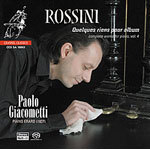
'Quelques riens pour album' Complete works for piano, vol. 4
 $35.09
Out of Stock
$35.09
Out of Stock6+ weeks add to cart
ROSSINI
'Quelques riens pour album' Complete works for piano, vol. 4
Paolo Giacometti (piano)
[ Channel Classics SACD / SACD ]
Release Date: Monday 28 July 2003
This item is currently out of stock. It may take 6 or more weeks to obtain from when you place your order as this is a specialist product.
On Hybrid Super Audio CD (SACD) format, presented in full 5.1 surround sound! PLAYABLE ON ANY CD SYSTEM
SACD release
'Quelques riens pour album', 'An album of trifles', is the enigmatic title which Rossini gave to this colorful collection of 24 short pieces, the first 18 of which you can hear on this recording. The title is characteristic for his personality, euphemistic and full of self-mockery. Here once again is the older Rossini, who spent his final years in Paris, producing an abundance of small-scale, highly personal character pieces which he jokingly called 'Péchés de Vieillesse', or 'Sins of Old Age'. The album already occupies a special place within this considerable body of works, not least because it contains 24 pieces, a number which evokes Chopin's 24 preludes, which Rossini surely knew, not to mention Bach's 'Wohltemperierte Klavier'. Rossini, moreover, was also a great admirer of Bach's music, as witnessed among other things by his support for the then recently initiated publication of Bach's complete works by the Leipzig Bachgesellschaft.
It would be easy to assume that Rossini had initially intended to make use of all 24 keys; but he must have abandoned this project at some point, because the collection contains several pieces in the same key. Nevertheless the relationships between the pieces are stronger here than in his other albums, and the pieces themselves are frequently smaller in scale. Even more strikingly, most of them do not have individual titles, making them less independent of each other.
There are a couple of exceptions: for example, no. 12 (Danse Sibérienne) is a wild Siberian dance, no. 15 (Petite Galette Allemande) is a tasty German cake, and there is a whole story behind no. 16 (Douces Réminiscences, offertes à mon ami Carafa pour le nouvel an 1866, .….Oh fricaine!!!). At the very moment of the extremely successful premiere of Meyerbeer's 'l'Africaine', Rossini's good friend Carafa made a desperate request for funds. Rossini told him to come back the next day and gave him this piece to take to the publisher in exchange for payment. Probably he thought that the punning title would immediately awaken the publisher's association with the wildly successful opera, so that the publisher would immediately and unquestioningly give Carafa the money, not realizing that the piece had nothing at all to do with the opera. The ploy was successful, and Carafa was rescued, if only temporarily.
The incident speaks clearly of the irony that Rossini threads through these pieces, irony aimed sometimes at the audience, sometimes at himself; surely it is aimed at the pianist as well, for his technique is put to the test, sometimes to an absurd degree.
A good example is the last piece. After a charming introduction, Rossini subjects the pianist to a test of endurance with endless quantities of rapidly repeated chords in the left hand. I can imagine one of Rossini's famous parties, with the composer having decided to tease some poor pianist after dinner in order to see if he can really play as well as everyone says he can. The smile on his face would probably have been even broader at that moment if he had known that this challenge would still be taken seriously a century and a half later.
- Paolo Giacometti
Tracks:
1 Allegretto
2 Allegretto moderato
3 Allegretto moderato
4 Andante sostenuto
5 Allegretto moderato
6 Andante maestoso
7 Andantino mosso
8 Andantino sostenuto
9 Allegretto moderato
10 Andantino mosso
11 Andantino mosso
12 Allegretto moderato (Danse Sibérienne)
13 Allegretto brillante
14 Allegro vivace
15 Petite Galette Allemande, allegro brillante
16 Douces réminiscenses, andantino
17 Andantino mosso quasi allegretto
18 Andantino mosso
